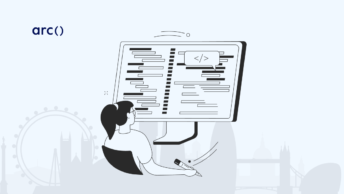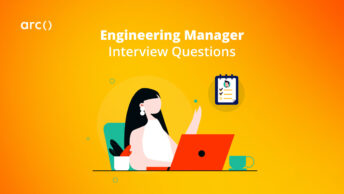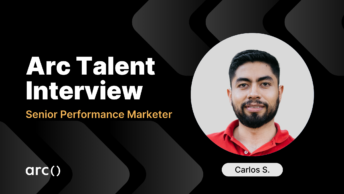When applying for any job in software development, the first person you deal with is usually a recruiter.
They might be an internal recruiter who works for the company or an external recruiter who finds candidates for several companies. They are both motivated to fill vacancies; however, they are incentivized in quite different ways that can be useful to remember as you move through the hiring process with them, more on that at the end though.
The flow of questions tends to primarily be from recruiter to candidate. Where have you worked previously? How much experience do you have with React? Tell me about a time when… Those types of questions.
They are interviewing you for a job, after all! However, it’s important to remember that you should also be asking lots of questions of the recruiter or hiring manager, as well. This interview process goes both ways, and you need to make sure it’s a process and company you are prepared to commit to if the offer is right.
Looking to hire the best remote developers? Explore HireAI to see how you can:
⚡️ Get instant candidate matches without searching
⚡️ Identify top applicants from our network of 300,000+ devs with no manual screening
⚡️ Hire 4x faster with vetted candidates (qualified and interview-ready)
Try HireAI and hire top developers now →
Best Questions to Ask Tech Recruiters
Software developer hiring processes are notoriously long-winded and involve multiple rounds.
Before you commit to spending 8+ hours of your life jumping through hoops, it’s sensible to make sure you know what you’re getting yourself into and if the company is the right fit.
Here are some good questions to ask recruiters early, perhaps in your introductory phone conversation or email:
1. What is the hiring process for this role?
This is always the first of my questions to ask recruiters, and you’ll find the answer varies widely.
It could be as simple as:
- A 30-minute interview with the line manager
- A 30-minute interview with the CTO
- Decision
Or as complicated as:
- An initial coding test
- A 1-hour life story presentation
- A technical deep dive on any chosen topic
- 2, or even 3, more rounds of coding tests
- Decision
Clearly, the first hiring process is going to take less time and be less stressful, whereas the second employment process will take much longer and need more consideration.
You should know which it is before getting started.
For me, the complexity of the interview process I am happy to go through is proportional to the impressiveness of the company or role.
If it’s a small web development agency working on fairly standard client projects, then I’m going to decline to interview if the process is long. If it’s a top-tier company with great pay, great benefits, and good career progression, then I’ll tolerate something longer.
The game is the game, after all, and if you want to work for a FAANG-type company, then it’s best to embrace it.
Read More: Non-Technical Interview Questions for Software Engineering Jobs
2. Is the interview process decision majority or unanimous?
If the answer to the first question is a multistage process with a different person at each stage, then I want to know if I need to get a yes from everyone or if it’s a majority decision.
If everyone needs to agree, then that significantly decreases your chances of getting the job. Each interviewer comes into the meeting fresh, while you come into each interview with the baggage of the previous rounds.
And, if they are back-to-back, there can be a compounding effect on your performance that makes it harder to perform as the day progresses. A requirement for a unanimous yes significantly reduces your chance of getting a job offer.
Also, some people are just bad interviewers and don’t realize it. If you get a technical test with a rude or abrupt individual, then you really want a majority decision for the interview process. One bad apple can kill your chances of getting the job, even if you did great in all the other rounds.
3. Why is this role vacant?
This is one of the best questions to ask recruiters or hiring managers, as it can tell you a lot about the role, the team, and the company in one fell swoop.
If answer for why the position is open is because someone recently left, then ask why they left as a follow-up question. If the hiring manager’s answer is vague, it could indicate the company has a retention issue with this role (or overall). If they say that the previous person was promoted, then that shows it’s a company that invests in employee development.
For a new role, ask the recruiter if it’s part of a reorganization or company growth. If a reorganization is their response, find out if that position has set roles and responsibilities that are understood by the wider company or if that will be something you get to determine. If it’s because of growth, ask how many people are being hired across all roles and if the organization structure above has been filled out yet.
I asked a recruiter these questions when interviewing at a large tech company once. Through their answers, I learned they had already filled the staff engineer and senior manager vacancies earlier in the year, and they were now filling senior developer roles within those teams. This told me that I would most likely be joining a team that was well planned out and had clear goals and objectives.
Read More: Questions to Ask at Interviews for Software Engineering Jobs
4. Remote OK?
This could well be your first question to ask recruiters in this post-pandemic world. It certainly is for some of my friends and family at the moment. It’s worth knowing early on what they expect from you and if you are happy with it.
Some people will only work 100% remotely, others like the option to choose (or a set hybrid scheme), and some really do prefer going into the office. There seems to be a correlation between having young children and wanting to go into an office!
Whatever you prefer, you need to get this question out of the way early and make sure to get real clarity on what they mean. There is a huge difference between hybrid required and hybrid optional.
Having the option of going into an office is nice for people like me who prefer fully remote with the occasional touchpoint. However, remote with a mandatory on-site every one or two weeks is a very different kettle of fish.
Arc is a radically different remote job search platform where companies apply to you. We feature developers directly to tech companies and startups and help you land a remote job in 14 days.
Sign up here.
5. Why me?
If the recruiter contacted you, as is so often the case with software developer roles, then it’s worth finding out why they decided to get in touch.
If they just saw “software developer” on your LinkedIn profile, then perhaps there’s nothing special or specific about your profile deeming you a good fit. If the recruiter highlights your extensive .NET experience and that the company is a Microsoft partner, then they possibly think you’re a strong candidate for that role. This increases your chances of getting the job, as at least one person thinks you specifically are a good fit.
The trick with asking this question of hiring managers or recruiters is to pay attention to how specific they are. If they are vague, then they might just be trying to pad the number of applications they bring their client. They’re probably a quality recruiter and more likely worth your time if they’re specific.
Internal recruiters tend to be a bit better at this than external recruiters due to how they are compensated (salaried vs by commission).
Read More: Software Developer Job Interview Mistakes to Avoid
6. What is the compensation range for this role?
Talking about money makes many people uncomfortable, and this is especially true at interviews. But, while YOU should never give a number upfront, make sure their range and your requirements align.
There will be a number below which you literally can’t afford to take the job. If your family expenses require a yearly salary of at least $80,000, you’d be pretty annoyed to get an offer after five rounds of interviews for $60,000 without room in their budget to go higher.
You will have wasted a lot of time on a job that you can’t afford to take.
As much as companies pitch being family-oriented and working for a higher cause, we all ultimately go to work to earn money so we can live. You need to know at the start of the process if both parties align, and they should have no problem sharing a range with you.
If they won’t give a salary range, instead answering with phrases such as generous, competitive, and aligned with the market, it might be a sign of other issues in the organization. Think carefully before proceeding.
I always translate “competitive salary” to “less than you want and more than we’d like” in my head.
7. Who does the role report to? What is the team structure?
I always ask these two questions to the recruiter at the same time. The answer to the second question puts the first one in context.
For example, if you report directly to the CTO along with a team of five other developers, you might conclude that the company is small and that this could be a high-growth, high-stress place. Fun if that’s what you’re looking for, of course, but still worth knowing before moving forward with the hiring process.
If the recruiter replies to your question saying you’d report to a team lead in a group of five developers, one tester, a data scientist, and a product person, this could be a larger, more structured company. A company like this might have gotten past its initial growing pains and could provide a more stable, long-term role with less stress, but also potentially less rapid career growth.
I think that without the second question, the answer to the first is fairly useless.
Read More: How to Answer Behavioral Questions at Software Developer Interviews
8. What stage of growth is the company in?
Companies go through a range of growth stages, and each one requires a different working mode and mindset. Knowing if they are a startup that’s just raised a seed round and is burning cash is important information if you’ve just had your first child, things are tight, and your mortgage payment looms large in your monthly budget.
That being said, a large company that owns its market, does a lot of maintenance work, and has struggled to bring out anything truly innovative for the last 10 years might be equally bad for your mental health, depending on what you’re looking for.
Other industries don’t have this issue quite so much as software. The venture capital fuel that gets poured into a lot of companies means there are lots of large companies paying high salaries who could nevertheless evaporate within 12 months if they fail to raise their series C, or whatever round they are on now.

Internal vs External Recruiters: What’s the Difference?
As we said at the start of this article, there are two main types of recruiters. When asking recruiters the questions above, it is useful to know who you are speaking to and how that may affect the answers they give and the information they have.
Internal recruiters
Internal recruiters work for the company for which the vacancy is being filled. They are paid a salary to find candidates and their bonus, if any, is likely tied to wider company metrics rather than simply filling software development job openings. Their primary job is to find the best candidates for the company and not to waste their colleagues’ time with clearly unsuitable people.
This means that if they contact you, they’re reasonably confident that you might be a good fit. But it will only be based on pattern matching between your software engineering resume and surface-level information they might have received from their colleagues unless they’ve shown your profile to the hiring manager as a pre-vet.
At most companies, internal recruiters will be looking for candidates for all types of roles, of which technology positions in software engineering could be the smallest portion and almost certainly the furthest from their own skillset. If that’s the case, be prepared for extra information to be thin on the ground.
If you’re talking to an internal recruiter, then it’s important to find out when the first opportunity you can have to talk to the technical hiring manager would be. There are some important questions to ask recruiters in the list above that HR can only give vague answers to.
If you are dealing with an internal recruiter, there should be some good wiggle room to negotiate the offer, as they don’t have to pay an external recruiter’s commission to hire you, which, as we look at in the next section, can be significant.
Read More: How to Show Off Your Soft Skills at Software Development Interviews
External recruiters
External recruiters work primarily on commission, which is typically 15% or more of the yearly salary negotiated for the successful candidate.
If they work for an agency (think Robert Half or one of their alternatives), they will get a small base salary and are expected to make up the rest by successfully placing candidates. They will get a portion of that 15% commission, but most goes to the agency to cover those base salaries and other costs.
Solo external recruiters are rarer and rely completely on that commission. This means they can only focus their time on the most promising candidates. This means that, if they contact you, it’s because they really think you stand a good chance of landing the role.
Expect these solo external recruiters to ask you many screening questions in the initial call. They’re not just assessing your ability to do the job but also how likely you are to interview well, show up for interviews, and then actually accept an offer if you get one.
One thing that is the same between external recruiters at agencies and their solo counterparts, though, is that the commission is important. Because their commission is a percentage of the salary you accept, they are highly motivated to help get you the best offer possible.
These recruiters will expect you to negotiate the offer when the time comes, but they’ll also help get you there. You pushing for $100,000 vs $90,000 is an extra $1,500 on their commission, so they will certainly back you over the client if they think the company has the budget.
Read More: Follow Up After Your Tech Interview With a Solid Thank-You Email
Conclusion
Hiring processes are lengthy, so making sure you tick off all the things that are important to you as early as possible is vital. And, knowing the right questions to ask recruiters and hiring managers gets you there. The earlier, the better!
You don’t want to waste your time reversing linked lists and talking about your latest large project only to find out there’s a deal-breaker that you could have unearthed on day one.
We hope you found our guide on questions to ask hiring managers and recruiters helpful! If you have any feedback or questions for tech recruiters we might have missed, let us know in the comments below. Thanks for reading!
You can also explore HireAI to skip the line and:
⚡️ Get instant candidate matches without searching
⚡️ Identify top applicants from our network of 250,000+ devs with no manual screening
⚡️ Hire 4x faster with vetted candidates (qualified and interview-ready)










Asesores!! I will take note of them for my next interview
Insightful, will definitely consider asking these questions on my next.